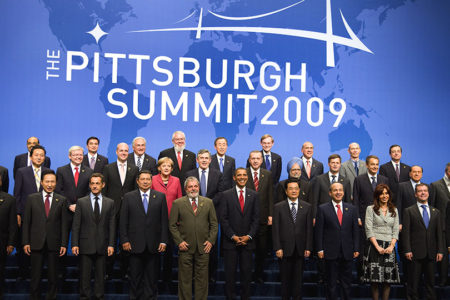The Kingdom of the Beast
It started out as a Coca-Cola® commercial featuring a multicultural group of teenagers singing on a hill outside Rome. The ad was so popular The New Seekers quickly recorded an expanded version minus the product reference. Within two weeks, “I’d Like to Teach the World to Sing” hit the charts, immediately striking a chord with the public and selling 96,000 records the first day. Soon people were humming the melody and singing the lyrics that spoke of a world where everyone lived together in perfect harmony.
The folksy tune and simple message encapsulated mankind’s yearning for global unity and peace. In the 1970s globalism seemed light-years away. Today it is knocking on our doors. Clearly, we are on the road to a one-world system. But what will that system be like? Will it bring the peace and harmony of which The New Seekers sang, or will it bring a sword?
The Bible teaches that a worldwide empire will exist prior to Christ’s Second Coming. The apostle John described it as “a beast rising up out of the sea, having seven heads and ten horns, and on his horns ten crowns” (Rev. 13:1).
This will be the final empire that will dominate the world before Christ sets up His Millennial Kingdom, and it will incorporate rebellious characteristics from each empire preceding it.1 On the Beast’s seven heads are blasphemous names suggesting unconcealed defiance toward God. More than 2,000 years ago, John defined the distinctive element of this prophesied global empire as “the spirit of the Antichrist,” which was already prevalent (1 Jn. 4:3).
Today it is becoming an increasingly pervasive influence. Walking down the street in Toronto a few months ago, I couldn’t help notice the large, distinct letters covering the entire side of a bus. The sign read, “THERE’S PROBABLY NO GOD. NOW STOP WORRYING AND ENJOY YOUR LIFE.”
Launched in the United Kingdom in 2008, the atheist bus project exceeded its organizer’s expectations. What started as a plan to run no-God ads on 30 buses in London grew to 800 throughout the UK. In less than a year, buses and billboards in prominent cities worldwide proclaimed the atheist message.2
More recently, a group calling itself the Rational Response Squad coaxed teenagers to take the “blasphemy challenge” and publicly renounce “any belief in the sky God of Christianity.”3 At the forefront of the movement is British biology professor Richard Dawkins—skeptic, prolific author, and outspoken atheist. He sees God as “arguably the most unpleasant character in all fiction: jealous and proud of it; a petty, unjust, unforgiving control freak; a vindictive…capriciously malevolent bully.”4
The Bible teaches the world will ultimately unite around a man characterized by this same defiant, rebellious, antagonistic attitude toward God. That man will be the Antichrist. Predominant in Scripture’s description of him is his blasphemous character. He is, in fact, blasphemy personified. The apostle John wrote, “He opened his mouth in blasphemy against God, to blaspheme His name, His tabernacle, and those who dwell in heaven” (Rev. 13:6). He will speak contemptuously of God, ridicule heaven, and mock all who dwell there.
The Mark of the Beast
Emerging to promote the Antichrist’s career will be a second beast identified as the False Prophet. He will come “up out of the earth” (v. 11; cf. 16:13; 19:20; 20:10). After mesmerizing the world with signs and miracles, he will take Earth’s enthralled population to the next level. In blasphemous defiance of God, he will order the erection of the Antichrist’s image and command the world to bow before it in worship. Going one step further, he will animate the image and, in a sadistic demonstration of power, give it the ability not only to speak, but also to kill anyone refusing to comply (13:15).
To solidify the planet’s subservience, the False Prophet will demand that everyone throughout the world receive a mark of allegiance to the Antichrist and his global empire. The Bible does not specify the mark’s shape or form, but the word translated “mark” is the Greek word charagma, meaning “mark or stamp, made by engraving, etching, imprinting, branding.”5
With his megalomaniacal obsession to control everyone and everything, the Antichrist will undoubtedly require relinquishing of personal privacy for the sake of the empire. Increased miniaturization of technology, digitization and compression of information, as well as the accessibility and speed of data transfer, could conceivably equip the coming global government to monitor the daily lives of individuals in a way never before possible. Today companies already use low-level technology to gather information about where you shop, what you purchase, your spending habits, and other data they consider necessary to develop marketing strategies. Not only is an enhanced version of this type of transparency inevitable, but it will be imperative to the ultimate form of globalization.6
Scripture does not specify whether the mark itself will incorporate the technology to identify each person, but the mark’s primary function will be to provide visible evidence of loyalty to the empire and its leader. It will be the minimum requirement for those simply wanting to function within the system. It is possible those who wish to show a greater degree of loyalty to the empire and solidarity with its leader may choose to wear either “the name of the beast, or the number of his name” (v. 17). Global compliance monitors will likely execute as traitors anyone caught without one of the marking options. Those not killed at once will have no ability to conduct business on any level.
The Mortal Wound
What may have looked like a cooperative dream will morph into a totalitarian nightmare through a series of events. The first is directly linked to the fact that one of the heads of the seven-headed beast will appear “as if it had been mortally wounded, and his deadly wound was healed” (v. 3). Some use this passage as evidence that the Antichrist is a resurrected dictator or some evil personage from the past. Since Satan does not have the power to impart life to the dead, this seems unlikely.
Others believe the mortally wounded head corresponds to the head of the beast representing the Roman Empire, which currently appears to be dead but will reemerge in the last days in a revived form. However, since Rome did not succumb to a definitive attack but crumbled slowly, many believe the head receiving the deadly wound is the Antichrist himself. This view seems to be indicated by the statement, “his deadly wound was healed.” Further encouragement to worship the Beast whose “wound was healed” provides the detail that he was “wounded by the sword and lived” (v. 14).
Since John used the term beast to refer to both the Antichrist and his kingdom, it is possible the head with the fatal wound speaks of the Antichrist being wounded in a way that threatens the collapse of this final and revived form of the Roman Empire, the focal point of which is the genius and charisma of its leader.
Speaking of this deadly wound, an angel says, “The beast that you saw was, and is not, and will ascend out of the bottomless pit and go to perdition” (17:8). The Greek word abyssou, translated “bottomless pit,” is literally “the abyss,” a descriptive word for Tartarus. This is a place where some demons are currently held for judgment and where Satan himself will be bound during the thousand years of the Messianic Kingdom (2 Pet. 2:4; Jude 6).7
Subsequent to receiving his deadly wound, the Antichrist is indwelt by a demonic spirit that is temporarily released from the abyss to empower and possibly even animate this evil ruler. When the Antichrist’s fatal wound is healed, the potential failure of his kingdom is averted; and “all the world marveled and followed the beast” (Rev. 13:3).
Working through the evil-spirit-indwelt Antichrist, Satan will give this global dictator all the resources necessary to subjugate the planet: “his power, his throne, and great authority” (v. 2). In addition to world adulation, “authority was given him over every tribe, tongue, and nation” (v. 7). Driven by crushing ambition for world conquest, this empire will rule the earth; no individual, nation, or people group will lie outside the future dictatorial rule of Antichrist and his global government.
On the Horizon
The next step toward absolute domination will come through a coalition of 10 contemporaneous leaders apparently representing regional populations. These leaders correspond to the 10 horns of “a beast rising up out of the sea” (v. 1) and the fourth beast in Daniel’s vision (Dan. 7:7), as well as the 10 toes of the feet of iron and clay in the vision of Babylonian King Nebuchadnezzar (2:41–43).
Recent events show how quickly such a scenario could unfold. An article published in The Globalist Paper analyzed last year’s G-20 summit as a global governance mechanism. Recommendations for enhancing the effectiveness of this representative body of world leaders would include whittling down the number of member countries from 20 to a “core membership of ten countries, five ‘old powers’ (France, Germany, Japan, United Kingdom and United States) and five ‘new powers’ (Brazil, China, India, Mexico and Russia).”8 The author proposed a three-year time frame for implementing necessary changes, with a target date of 2012.
The global coalition of leaders in the apostle John’s revelation is short-lived: “They receive authority for one hour as kings with the beast” (Rev. 17:12). The Greek words mian horan describe “‘a part of the day,’ especially a twelfth part of day or night, an ‘hour.’”9 Not only will the tenure of these 10 world leaders be exceptionally brief, but it could conceivably be one literal 60-minute hour. Immediately after receiving their mandate to provide global leadership, they could transfer their authority to the Antichrist by unanimously agreeing that he is their only hope for global unity and the only one capable of addressing the complex issues facing the world.
The common bond in their relationship with the Antichrist will be their animosity toward God and all who hold to a biblical worldview. Ultimately, this 10-leader coalition will join the Beast in his audacious attempt to prevent Jesus Christ’s return to establish His Messianic Kingdom (Ps. 2; Rev. 19:19). In the meantime, the global empire will make war with the saints, and all those disloyal to the Antichrist and his kingdom will experience unprecedented persecution and death (Dan. 7:25; Rev. 13:7).
The Bible documents man’s first attempt to construct a global community when the postdiluvian world gathered on the plains of Shinar to build “a tower whose top is in the heavens” (Gen. 11:4). Fearing isolation, Nimrod masterminded the rebellious project, promoting it as a focal point for unified worship, cooperative solidarity, technological collaboration, and urban prosperity.10
Today people again believe that, through global consensus, they can resolve the myriad of issues facing the planet. They are turning toward global governance to prevent environmental disaster, energy shortages, economic instability, unfair trade practices, nuclear annihilation, religious intolerance, terrorism, overpopulation, pandemics, and world hunger.
The plan to unite the world in a spirit of global cooperation, however, will culminate with the earth subjugated by a demon-possessed despot ruling the ultimate totalitarian empire. And the dream of a godless utopia, with people living together in perfect harmony, will morph into the world’s worst nightmare.
ENDNOTES
- The angel explained to John that the heads represent seven empires, five of which had already come and gone (Egypt, Assyria, Babylon, Medo-Persia, and Greece); one that was in existence during John’s life-time (Rome); and one that was still future (Rev. 17:11).
- Cory Doctorow, “Atheist bus ads roll in London today: massive success,” January 6, 2009 <boingboing.net/2009/01/06/atheist-bus-ads-roll.html>.
- The Rational Response Squad, “The Blasphemy Challenge,” December 14, 2006 <richarddawkins.net/print.php?id=425>.
- Richard Dawkins, The God Delusion (New York: Houghton Mifflin, 2006), 51.
- Timothy Friberg, Barbara Friberg, and Neva F. Miller, Analytical Lexicon of the Greek New Testament, Baker’s Greek New Testament Library (Grand Rapids, MI: Baker Books, 2000), accessed via Logos Software.
- Thomas L. Friedman, The Lexus and the Olive Tree (New York: Anchor Books, 2000), 171–174.
- Renald Showers, Those Invisible Spirits Called Angels (Bellmawr, NJ: The Friends of Israel Gospel Ministry, Inc., 1997), 89.
- Lex Rieffel, “Regional Voices in Global Governance: Looking to 2010 (Part IV),” March 27, 2009 <theglobalist.com/StoryId.aspx,?StoryId=7630>.
- E. Vine, Vine’s Complete Expository Dictionary of Old and New Testament Words (Nashville, TN: Thomas Nelson, 1985), 312.
- Henry Morris, The Genesis Record (Grand Rapids, MI: Baker Book House, 1976), 264–269.







